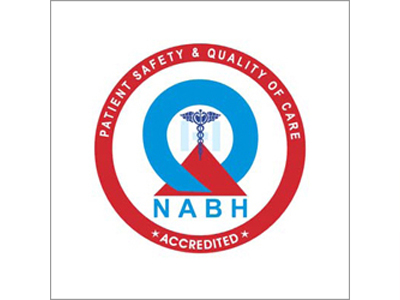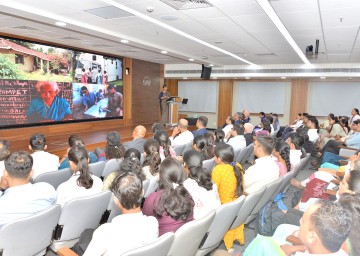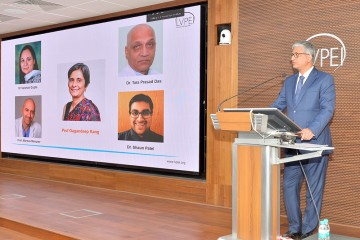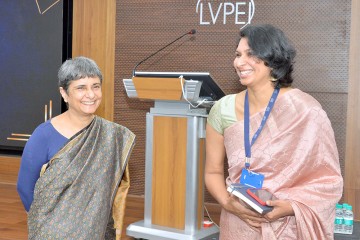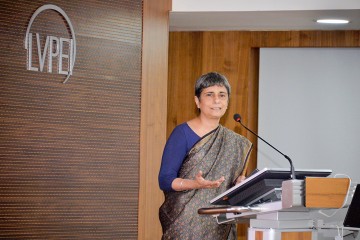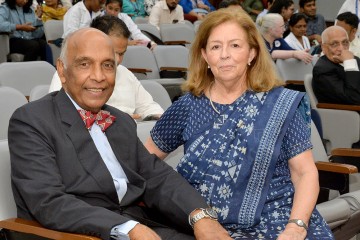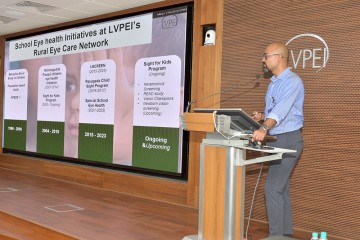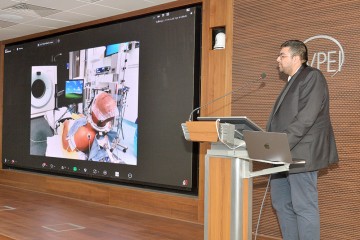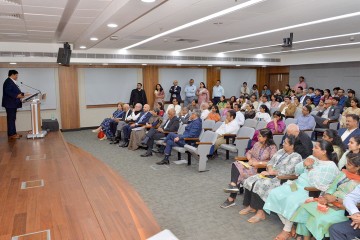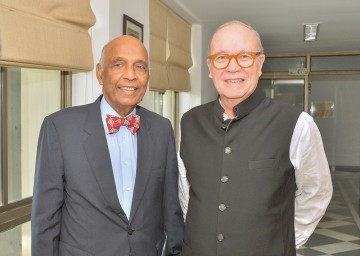The 17th Champalimaud Symposium, celebrating the longstanding research collaboration between L V Prasad Eye Institute and Champalimaud Foundation was held at the L V Prasad Eye Institute, Kallam Anji Reddy campus on Sunday, February 2, 2025. The event was a vibrant showcase of notable research from both institutes, as well as invited guests, highlighting the latest advancements across a diverse range of fields.
Dr Prashant Garg, Executive Chair-LVPEI welcomed the gathering and Dr Gullapalli N Rao, Founding Chair took the gathering down memory lane, highlighting some of the key collaborations between LVPEI and the Champalimaud Foundation, over the years. Ms Leonor Beleza, Chair of the Champalimaud Foundation shared an overview of the activities of the foundation in 2024, reflecting warmly on the many ways in which both institutions have contributed to each other’s successes. She was joined by Mr. John Silveira Botelho, Vice President of the Champalimaud Foundation.
The symposium featured three scientific sessions, each comprising a keynote address and two presentations from LVPEI’s internal speakers. In addition, the program included the prestigious Champalimaud Oration and an additional keynote talk.
This year The Champalimaud Oration was delivered by Prof. Gagandeep Kang, an eminent infectious disease researcher from India. She currently serves as the Director - Enterics, Diagnostics, Genomics and Epidemiology, Global Health at the Bill and Melinda Gates Foundation, Seattle, USA, and has been a member of the WHO’s global advisory committees on vaccine safety and immunization and vaccine implementation research. She is the recipient of the Infosys Prize in Life Sciences and the first Indian woman Fellow of the Royal Society (FRS) in London. Prof. Kang’s inspiring talk highlighted the significant contributions of Indian science to global health research. Using her own work on rotavirus vaccine development as an example, she also underscored the role of LVPEI’s model in advancing global eye health. Prof Kang spoke about the need for diarrheal disease research in India, the discovery of cholera toxin, the use of oral rehydration, the development of indigenous rotavirus vaccines, and the role of the gut in determining response to infection and vaccination, which led to insights that inform our understanding of the drivers of disease and outcomes. She elaborated on how the journey of developing and testing rotavirus vaccines all the way through clinical efficacy trials has enabled India to be among the few countries in the world that have vaccinated their population with indigenous vaccines. Furthermore, she emphasized how affordable, high-impact solutions from India could help address critical healthcare challenges in resource-limited settings, such as Africa. She firmly believes India is set to innovate and contribute to the health of the world with its vaccine science and manufacturing.
Session I
Keynote 1: Transforming lab insights into management solutions for ocular TB
Prof Vishali Gupta, Professor of Ophthalmology - Postgraduate Institute of Medical Education and Research (PGIMER), Chandigarh, India is an accomplished Vitreo-Retina and Uvea expert of international repute. Considering the diverse phenotypes of TB in the eye, ranging from infective to immune-mediated varieties, Prof Gupta explored the relationship between laboratory findings and clinical manifestations. She focused her talk on tubercular serpiginous-like choroiditis and its relationship with antituberculosis treatment, an area that has been central to her research since her early days as a clinician-scientist. She highlighted key discoveries made by her lab over the years, shedding light on critical advancements in the field.
The session also featured presentations by Dr. Swati Singh, a young clinician-researcher from LVPEI, who discussed her team’s innovative approaches to countering lacrimal gland defects in Sjögren's syndrome using the latest techniques to address dry eye disease.
Dr. Soumyava Basu, an experienced clinician-researcher and Network head of LVPEI’s Uveitis Services, delivered an insightful talk on single-cell sequencing and its role in uncovering new information about chronic inflammation in the eye.
Session II
This session centered on cutting-edge research in immunology and genetic therapies. Dr. Sanhita Roy, Head of the newly established Dr. Chigurupati Nageswara Rao Ocular Pharmacology Research Centre at LVPEI, presented her work on S100A12, a novel host defense peptide with potential as an antimicrobial agent against difficult-to-treat bacterial and fungal infections, an area of growing significance given the global threat of antimicrobial resistance.
Dr. Indumathi Mariappan, a senior research scientist at LVPEI, took the audience through her team’s pioneering work on developing disease-specific human induced pluripotent stem cell (iPSC) lines and applying CRISPR/Cas9 gene-editing technology for novel therapeutics targeting inherited genetic eye disorders.
Keynote 2: Cell Therapy and Genetic Engineering at the Champalimaud Foundation
Dr Markus Maeurer Head, Immunotherapy and Immunosurgery at the Champalimaud Foundation, Lisbon, Portugal, and Full Professor at the I Medical Clinic of the University of Mainz, Germany. He is also an Advisor to the UK Parliament and the Italian Government and a Fellow of the Royal Chamber of Physicians, London.
With the Champalimaud Foundation recently establishing the world’s first dedicated center for pancreatic cancer and securing exclusive rights to use CRISPR for engineering immune cells, Dr Markus shared insights into his research on improving tumor-infiltrating lymphocyte (TIL) therapy for solid cancers. He discussed strategies to overcome the limitations of current chimeric antigen receptor (CAR) T-cell therapies and explored how CRISPR-based platforms could enhance T-cell fitness, address tumor heterogeneity, and shape a robust tumor microenvironment for more effective and clinically relevant immune responses.
Keynote 3: A new paradigm in managing acute post-cataract endophthalmitis in India
The next Keynote was delivered by Dr Taraprasad Das, Vice Chair (Emeritus), L V Prasad Eye Institute, Hyderabad, India. He is the recipient of the Padma Shri, the fourth-highest civilian award by the Government of India, Dr Das presented the findings from the Endophthalmitis Management Study (EMS), a multicentric randomized control trial on acute post-cataract endophthalmitis, aimed at understanding the evolving microbiological spectrum of post-cataract endophthalmitis, particularly in the context of antibiotic resistance. Dr. Das revisited the landmark Endophthalmitis Vitrectomy Study (EVS), which has guided clinical management for over 25 years, and outlined EMS’s two primary objectives: (a) developing India-specific guidelines for vitrectomy in endophthalmitis and (b) identifying the most effective intravitreal antibiotic for gram-negative infections... Over 56 months, EMS recruited 428 eligible patients (53.7% male) from four participating centers in three states of India. Dr. Das shared key findings from this ambitious and timely research initiative.
Session III
The final scientific session featured talks on public health and technological innovations. Mr. Winston Prakash, a young public health researcher from LVPEI, provided insights into LVPEI’s impactful child eye health initiatives within its rural eye care network, one of several public health programs making a difference at the community level.
Dr. PremNandhini Satgunam, a scientist in LVPEI’s Optometry and Vision Sciences department, spoke about her pioneering work on Baby Vision Screener (BaVis), an innovative device developed by her team to objectively assess infant development using infants' response time to visual cues. Compared to the subjective screening methods currently used worldwide, this breakthrough could revolutionize pediatric growth assessment, with implications far beyond eye health.
Keynote 4: Harnessing Virtual Reality: The Ultimate Healthcare Tool
The day concluded with a captivating keynote by Dr Shaun Patel, a neuroscientist, entrepreneur, and investor. He is co-founder & CEO of REACT Neuro, a digital health company that leverages virtual reality (VR) and machine learning (ML) Shaun and his team have been working with the LVPEI for developing VR and ML-based applications for vision and oculomotor evaluation.
Dr Patel elaborated on why VR has the potential to revolutionize healthcare by shifting brain health from being reactive to proactive. With its capacity to measure novel physiological signals, deliver dynamic feedback, and adapt effortlessly to the unique needs of individual patients and by addressing challenges like integration into existing systems and ensuring equitable access, VR can usher in a new era of precision, personalization, and proactive care, ultimately fostering resilience and driving better outcomes in modern medicine — democratizing brain health.
